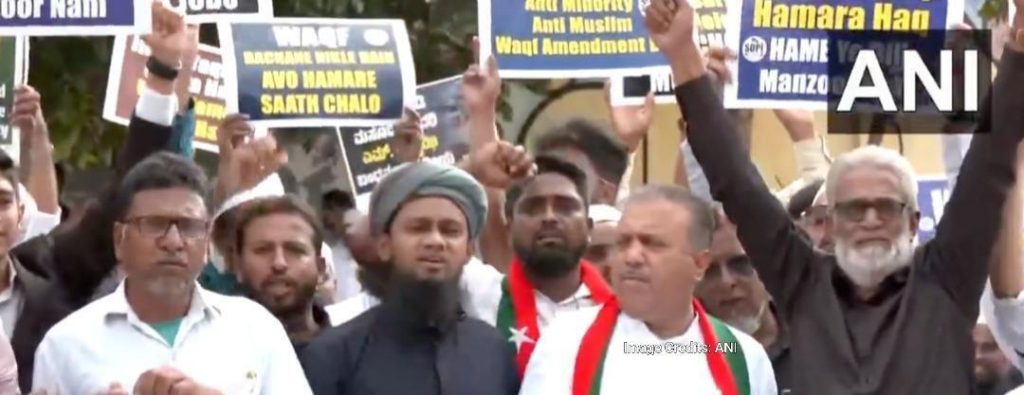
Protests Erupt in Kolkata, B’luru as Parliament Clears Waqf Bill
In a dramatic turn of events, protests broke out in several parts of the country on Friday, including Kolkata, Bengaluru, and Chennai, after Parliament cleared the Waqf (Amendment) Bill, 2025. The protests saw thousands of people taking to the streets, waving national flags and holding posters to express their dissent against the Bill.
The Waqf (Amendment) Bill, 2025, was passed by the Lok Sabha on Thursday, despite opposition from several parties and Muslim organizations. The Bill aims to amend the Waqf Act, 1995, which governs the management of Auqaf or charitable endowments belonging to Muslim communities.
The protests, which were called by various Muslim organizations, saw people of all ages and backgrounds participating. In Kolkata, protesters marched from the Maulana Azad Medical College to the Shahid Minar, waving national flags and holding posters with slogans like “We reject Waqf amendment” and “Reject Waqf Bill.” The protesters also shouted slogans like “Inquilab Zindabad” and “Waqf Bill is anti-Muslim.”
In Bengaluru, the protests were even more intense, with thousands of people gathering at the Freedom Park. Protesters held placards with slogans like “Hands off Waqf” and “Stop communalization of Waqf.” Some protesters also wore black badges to show their opposition to the Bill.
In Chennai, protesters marched from the Esplanade to the Marina Beach, waving national flags and holding posters with similar slogans. The protesters also shouted slogans like “Save Waqf” and “Waqf Bill is a threat to Muslim rights.”
The protests were called by several Muslim organizations, including the All India Muslim Personal Law Board (AIMPLB), the Jamiat Ulama-i-Hind, and the Bengaluru-based Muslim organization, the Jamiat-e-Ulama-e-Hind.
The Waqf (Amendment) Bill, 2025, has been criticized by Muslim organizations and opposition parties, who claim that it is an attempt to dilute the autonomy of Waqf boards and give more powers to the central government. The Bill also seeks to increase the tenure of Waqf board members from five to 10 years, which is seen as an attempt to give the government more control over the management of Auqaf.
The protests are a significant development, as they reflect the widespread opposition to the Bill among Muslim communities across the country. The protests are also a testament to the growing anger and frustration among Muslim communities, who feel that their rights and interests are being ignored by the government.
The protests also highlight the growing divide between the government and Muslim communities, which has been exacerbated by recent incidents of communal violence and hate crimes. The protests are a reminder that Muslims in India are not just a minority community, but also a vital and integral part of the country’s social fabric.
In conclusion, the protests against the Waqf (Amendment) Bill, 2025, are a significant development in the ongoing debate over the Bill. The protests reflect the widespread opposition to the Bill among Muslim communities across the country and highlight the growing divide between the government and Muslim communities. The protests are a reminder that Muslims in India are not just a minority community, but also a vital and integral part of the country’s social fabric.






